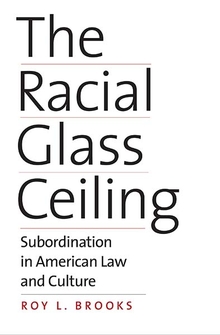The Racial Glass Ceiling
WARNING
You are viewing an older version of the Yalebooks website. Please visit out new website with more updated information and a better user experience: https://www.yalebooks.com
Subordination in American Law and Culture
Roy L. Brooks
A compelling study of a subtle and insidious form of racial inequality in American law and culture.
Why does racial equality continue to elude African Americans even after the election of a black president? Liberals blame white racism while conservatives blame black behavior. Both define the race problem in socioeconomic terms, mainly citing jobs, education, and policing. Roy Brooks, a distinguished legal scholar, argues that the reality is more complex. He defines the race problem African Americans face today as a three-headed hydra involving socioeconomic, judicial, and cultural conditions. Focusing on law and culture, Brooks defines the problem largely as racial subordination—“the act of impeding racial progress in pursuit of nonracist interests.” Racial subordination is little understood and underacknowledged, yet it produces devastating and even deadly racial consequences that affect both poor and socioeconomically successful African Americans. Brooks addresses a serious problem, in many ways more dangerous than overt racism, and offers a well-reasoned solution that draws upon the strongest virtues America has exhibited to the world.
Why does racial equality continue to elude African Americans even after the election of a black president? Liberals blame white racism while conservatives blame black behavior. Both define the race problem in socioeconomic terms, mainly citing jobs, education, and policing. Roy Brooks, a distinguished legal scholar, argues that the reality is more complex. He defines the race problem African Americans face today as a three-headed hydra involving socioeconomic, judicial, and cultural conditions. Focusing on law and culture, Brooks defines the problem largely as racial subordination—“the act of impeding racial progress in pursuit of nonracist interests.” Racial subordination is little understood and underacknowledged, yet it produces devastating and even deadly racial consequences that affect both poor and socioeconomically successful African Americans. Brooks addresses a serious problem, in many ways more dangerous than overt racism, and offers a well-reasoned solution that draws upon the strongest virtues America has exhibited to the world.
Roy L. Brooks is Warren Distinguished Professor of Law at the University of San Diego and the author of many books and articles on race, human rights, and law.
"Roy Brooks offers a thought-provoking augmentation of our vocabulary for discussing the constitutional and statutory law of race discrimination. His idea that overcoming racial and cultural subordination is different from race-neutral decision making, integration, and other responses to our current situation deserves careful attention."—Mark Tushnet, author of In the Balance: Law and Politics on the Roberts Court
"Roy Brooks has long been one of our most thoughtful, astute commentators on contemporary racial issues. His new book—which focuses insightfully on racial subordination as distinct from racism—will commence a productive conversation among those who want to think more carefully, and more deeply, about racial inequality in the United States today." —Michael J. Perry, author of Human Rights in the Constitutional Law of the United States
"Provocative and inspiring. Brooks offers breakthrough thinking for out critical debate about racial inequalty."--Pat Chew, editor of The Conflict and Culture Reader
“The issues of racial subordination which Brooks raises are routinely faced by African American lawyers, and have perplexed even the most well-meaning law firms for many years. Brooks presents a unique analysis of racial disadvantages faced by blacks, regardless of class, and offers an interesting way to address these complex legal and cultural issues going forward. I highly recommend his book.”—H. Russell Frisby, Jr., Partner, Stinson Leonard Street LLP
ISBN: 9780300223309
Publication Date: May 30, 2017
Publication Date: May 30, 2017
256 pages, 6 1/8 x 9 1/4








